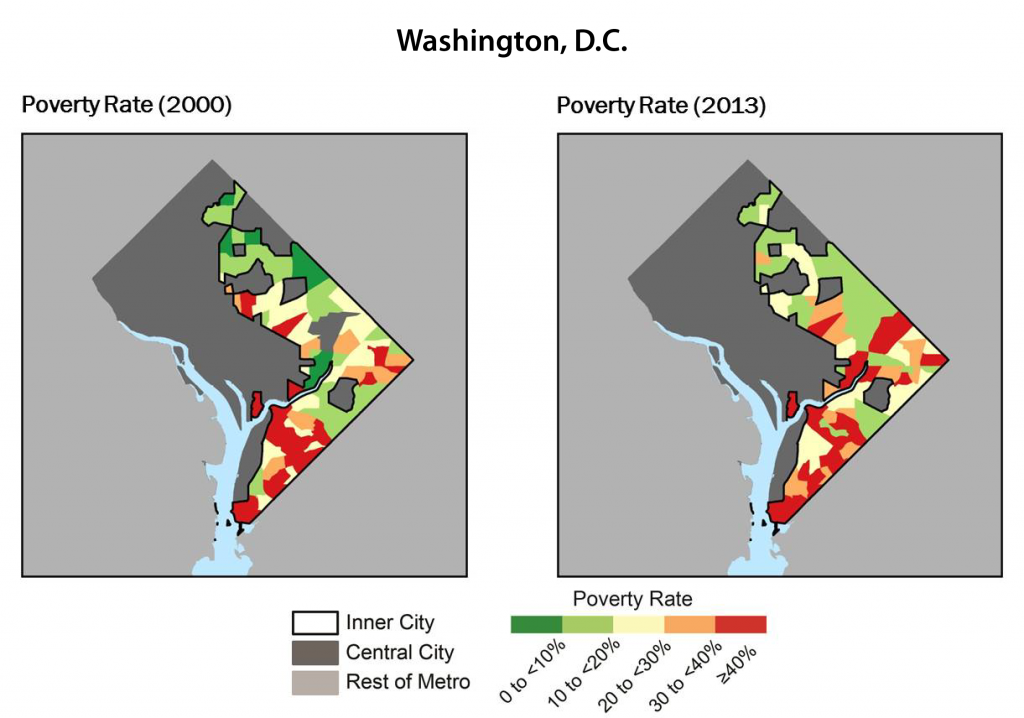Back

Blog
#CityCloseUp: Poverty Continues To Rise In Washington, D.C.

Written by Liz Holden
“The best part about running Enlightened… is being able to make a difference in my community, make a difference with my customers and give people jobs,”Enlightened, Inc. CEO and President Antwanye Ford told ICIC in a video last fall. The three-time Inner City 100 winning company was awarded with the Chevron Dorothy A. Terrell Community Impact Award, an honor given to the company for its community impact, civic engagement and track record of providing quality jobs for urban residents.
In 2015, seven of our Inner City 100 honorees were based in Washington, D.C. – the second-highest number of any city. Besides Enlightened, our District-based companies included Business Resource and Security Services, Creative Business Solutions, Inc., Keller Williams Capital Properties, Compass Solutions, Menkiti Group and TCG. Since the Inner City 100 began in 1999, 19 Washington, D.C. companies have made the list.
Despite some revitalization, many of the District’s inner city neighborhoods continue to struggle. ICIC’s research finds that poverty and unemployment increased in inner city Washington, D.C. between 2000 and 2013. The inner city poverty rate increased only slightly – from 27 percent in 2000 to 28.6 percent in 2013, a change of 1.6 percent. The unemployment rate increased 3.8 percent over the same period, from 15.5 percent to 19.3 percent. As shown in the map above, demographic change varied across neighborhoods, with an increasing number experiencing poverty rates greater than 40 percent.
According to a report by the Urban Institute, Washington, D.C.’s median income tracked closely with that of the U.S. between 1984 and 2007. In 2007, it diverged, rising at a faster rate than that of the U.S. as a whole. At the same time, D.C.’s unemployment rate was actually higher than the U.S. average – suggesting that while the city as a whole has seen prosperity in recent years, not all residents have benefitted from this economic growth. An analysis of U.S. Census data by the D.C. Fiscal Policy Institute, found that between 2007 and 2013, the city’s poorest residents actually saw their average wages decline, while middle- and high-income residents saw modest gains.
In a blog post last month, we looked at the progress that has been made on Washington, D.C.’s Five-Year Economic Development Plan. The plan calls for a sector-based strategy, with visions to grow the city’s technology, retail and medical sectors. While the most progress has been made in the technology sector, retail and medical industries offer accessible opportunities for inner city residents. A new mayor, Muriel Bowser, took office in 2015, midway through the plan, and it is unclear whether the new administration will continue with the same economic development priorities.
Retail establishments and the medical cluster may be particularly poised to provide jobs for low-income residents; previous ICIC research found that two-thirds of healthcare jobs require an associate’s degree or less. Growth in these areas may be especially powerful in a city whose residents have seen uneven economic recovery, and continued focus on these industries may help to ensure that all residents benefit from economic growth.
Companies like Enlightened can also make a difference. The technology consulting firm, which boasted a 105 percent five-year growth rate, focuses on workforce development and runs an internship program that helps city residents learn technology skills and grow with the company. “I’ve seen inner cities… evolve,” Antwanye Ford, a District native, told ICIC. “And I want to make sure that as they become more prosperous, that the people who live here become part of that.”
